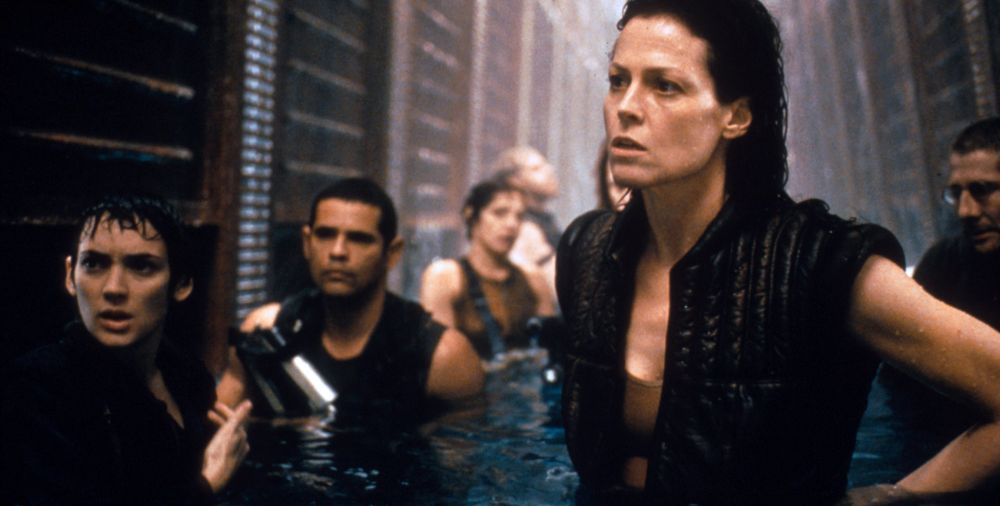 ★★★½
★★★½
“Alien vs. Firefly”
It’s not often that a film series manages to recover from – or even, survive – such a disastrous mis-step. But the Alien franchise managed it, though it took five years to come to fruition, and a Really Big Cheque to Sigourney Weaver [reportedly, $11 million, as well as a producer’s credit. The results, while short of the original two movies, are an awful lot better than its predecessor, managing to progress the story, re-invent Ripley and be generally entertaining. However, from a 2012 perspective, it’s painfully obvious that writer Joss Whedon recycled large chunks of the supporting characters, and turned them into Firefly. We’ll get to that a bit later.
It is set 200 years into the future, and begins with scientists on a space-station creating a clone of Ripley, using DNA from blood samples. They also remove the alien queen embryo which she was carrying, growing that, but keep her around for further study, intrigued by her apparent mix of human and alien DNA that’s giving her unusual powers [not unlike the way Alice fuses with the T-virus in the middle Resident Evil movies]. Docking with them is the Betty, a ahip operating on the fringes, which is bringing the scientists some meat popsicles in which they can incubate more aliens. Annalee Call (Ryder) appears to recognize the threat Ripley poses, and tries to kill her – but it’s too late, as the aliens have escaped their containment facility. Ripley and the crew have to team up, to try and fight their way back through the station to the Betty, which is the only means of escape left.
That’s an improvement in terms of a storyline over 3, simply because it is one, and provides a skeleton upon which a good amount of interesting ideas and fun sequences can be built. Jeunet came to the movie from some visually-striking French films, such as The City of Lost Children, and there’s a much better sense of cinematography apparent here – it’s a striking contrast to Fincher’s approach, where it appears his main direction to the DP was “Darker. Make it darker.” Here, you can see what’s happening: particular standouts include the first confrontation between Ripley and the Betty crew, in the basketball court, where Ripley sinks a long-range shot behind her back [legitimately done by Weaver], and a lengthy underwater sequence, where you’ll probably find yourself trying – and likely, failing – to hold your breath.
 But the central idea is the one of Ripley now being something more than human, and Weaver has a great deal of fun with that, playing as if she’s half a beat ahead of everyone else, and completes her transition by no longer being scared of the aliens. It’s them who need to be scared of her, and again, I’m reminded of Milla Jovovich in the RE series: more than human, and yet, less than human at the same time. There’s even a creature with the proportions the other way round – monster with a touch of human – like Nemesis from RE: Apocalypse, and it was no surprise to read that Paul W.S. Anderson was one of the many directors considered for this (Danny Boyle, Peter Jackson, Bryan Singer and David Croneberg beinh among the others). I briefly drifted off to speculate on the possibility of an Alien vs. Resident Evil cross-over; would probably have been a lot more fun than anything involving Predators.
But the central idea is the one of Ripley now being something more than human, and Weaver has a great deal of fun with that, playing as if she’s half a beat ahead of everyone else, and completes her transition by no longer being scared of the aliens. It’s them who need to be scared of her, and again, I’m reminded of Milla Jovovich in the RE series: more than human, and yet, less than human at the same time. There’s even a creature with the proportions the other way round – monster with a touch of human – like Nemesis from RE: Apocalypse, and it was no surprise to read that Paul W.S. Anderson was one of the many directors considered for this (Danny Boyle, Peter Jackson, Bryan Singer and David Croneberg beinh among the others). I briefly drifted off to speculate on the possibility of an Alien vs. Resident Evil cross-over; would probably have been a lot more fun than anything involving Predators.
As noted, what’s startling are the parallels between the Betty and the Serenity, from Whedon’s show Firefly, which came out in 2002. Both operate on the edge of legality, with a small crew of oddballs: Capt. Frank Elgyn (Michael Wincott) is somwhat less sympathetic than Mal Reynolds, but in both you have a captain/first-mate/pilot trio of two men and a woman, two of whom are in a relationship, plus a mechanic from an unexpected minority (there, a woman; here, disabled). If Perlman’s lumbering mercenary Johner isn’t a blatant dry run for Jayne Cobb, I don’t know what is, and there’s more than a touch of mechanic Kaylee Frye to be seen in Annalee. Writing as someone who found Firefly no more than a passable timewaster, it’s amusing to see Whedon was stealing from himself. Still, if you’re going to plagiarize, best use your own work, I suppose.
Oddly, Whedon hated this finished product almost as much as Fincher did the third, saying, “It was mostly a matter of doing everything wrong. They said the lines…mostly…but they said them all wrong. And they cast it wrong. And they designed it wrong. And they scored it wrong. They did everything wrong that they could possibly do. There’s actually a fascinating lesson in filmmaking, because everything that they did reflects back to the script or looks like something from the script, and people assume that, if I hated it, then they’d changed the script…but it wasn’t so much that they’d changed the script; it’s that they just executed it in such a ghastly fashion as to render it almost unwatchable.” It seems likely that’s why he recycled so many of his characters for Firefly.
It’s far from perfect, however. The biggest flaw is Ryder, who is completely unconvincing, and not a patch on her predecessors [if you’re thinking, “What predecessors?”, there’s a clue in the initial letter of her character’s surname…]. I wasn’t too fond of the way the film went in the final act, and the human-alien hybrid is neither convincing nor scary. It’s damn hard to believe that Whedon came up with five endings, and this was the one Jeunet picked as the best. But, really: after the dismal failure which was part three, it was a major relief to see something even semi-competent, which managed to sustain my interest (okay: consciousness) much better, and be generally entertaining.
Dir: Jean-Pierre Jeunet
Star: Sigourney Weaver, Winona Ryder, Ron Perlman, Dominique Pinon
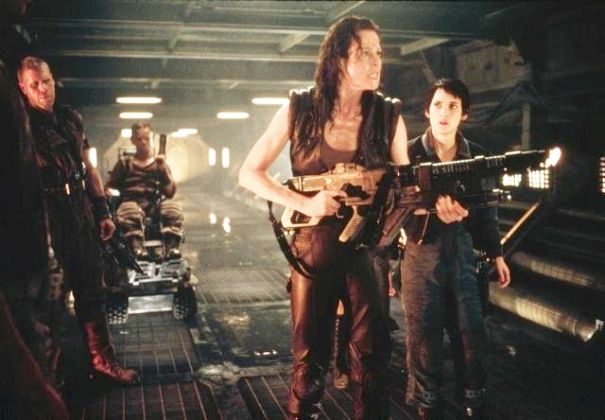
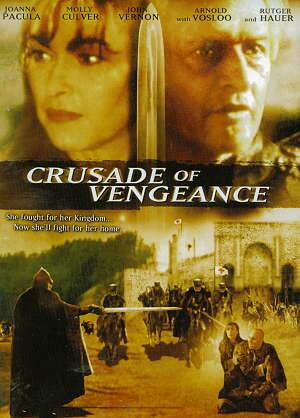 It’s easy to dismiss this, for its low production values, sometimes laughable dialogue and wildly-implausible plot – and I could hardly argue. Yet we still enjoyed this, thanks largely to performances which sustained us through the bad matte paintings, clunky lines, and mediocre action scenes. Of course, to use a pro-wrestling term, we’re huge Rutger marks, so seeing him as evil medieval warlord Grekkor is a big plus, harking back to his work in Flesh + Blood for Paul Verhoeven. Pacula is a “crusader mom” (for want of a better word), back from the Holy Land where she vowed to go after making a deal with God to let her son survive. However, she returns just after Grekkor and his sidekick (Vosloo) have swept her boy off with them. She goes to rescue him, teaming up with three other women on the way, as she heads towards the inevitable confrontation with Grekkor.
It’s easy to dismiss this, for its low production values, sometimes laughable dialogue and wildly-implausible plot – and I could hardly argue. Yet we still enjoyed this, thanks largely to performances which sustained us through the bad matte paintings, clunky lines, and mediocre action scenes. Of course, to use a pro-wrestling term, we’re huge Rutger marks, so seeing him as evil medieval warlord Grekkor is a big plus, harking back to his work in Flesh + Blood for Paul Verhoeven. Pacula is a “crusader mom” (for want of a better word), back from the Holy Land where she vowed to go after making a deal with God to let her son survive. However, she returns just after Grekkor and his sidekick (Vosloo) have swept her boy off with them. She goes to rescue him, teaming up with three other women on the way, as she heads towards the inevitable confrontation with Grekkor.




 This will only make sense, or be in any way entertaining, if you’ve seen Bloodrayne 3: The Third Reich: because it’s basically the same film, with a really fat chick (Hollister) replacing Natassia Malthe. And when I say, “the same film,” I mean the same storyline, same actors playing the same roles, and same scenes in the same locations. Really, I suspect this must have been made at the same time, with Boll simply swapping out Hollister for Malthe every other take. As there, the heroine is a half-human, half-vampire, who finds herself involved in a Nazi plan to take the powers of vampirism and turn them to their own ends. Except here, it is, of course, a spoof – and one so extremely broad, the makers of those Epic Movie flicks would have been cringing on occasion. Fat jokes, gay jokes, Nazi jokes… No easy target is left unstoned, paved with deliberate anachronisms like Segways and Internet dating.
This will only make sense, or be in any way entertaining, if you’ve seen Bloodrayne 3: The Third Reich: because it’s basically the same film, with a really fat chick (Hollister) replacing Natassia Malthe. And when I say, “the same film,” I mean the same storyline, same actors playing the same roles, and same scenes in the same locations. Really, I suspect this must have been made at the same time, with Boll simply swapping out Hollister for Malthe every other take. As there, the heroine is a half-human, half-vampire, who finds herself involved in a Nazi plan to take the powers of vampirism and turn them to their own ends. Except here, it is, of course, a spoof – and one so extremely broad, the makers of those Epic Movie flicks would have been cringing on occasion. Fat jokes, gay jokes, Nazi jokes… No easy target is left unstoned, paved with deliberate anachronisms like Segways and Internet dating.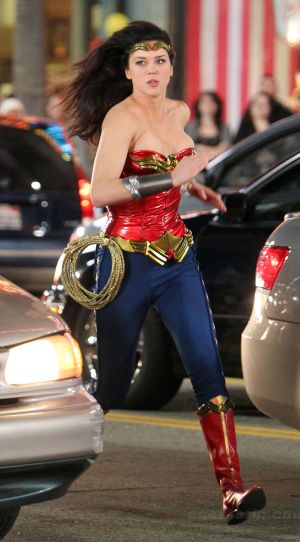 Allowing for the fact this was more or less a rough-cut – you can still see the wires as the heroine throws villains around – this actually is far from the atrocity you expect, going from the pre-production fan loathing. The story avoid the whole “origins” thing, hitting the ground running by having Wonder Woman/Diana Prince (Palicki) already fully-active, and busting crime around Los Angeles. Her extra-legal activities, with the local cops’ complicity, bring her to the attention of the federal authorities. Meanwhile, she’s tussling with the board of her company over the merchandise that funds her crime-fighting, objecting to the size of the tits on her action-figure – and, yes, they actually say “tits”, to my surprise. Finally, the villainess (Hurley) is performing illegal medical experiments with steroids and such, to create super-soldiers, and it’s up to Wonder Woman, her plane (wisely, no longer invisible), bullet-deflecting bracelets and lasso which may or may not be of truth (it’s unclear from this episode) to stop her.
Allowing for the fact this was more or less a rough-cut – you can still see the wires as the heroine throws villains around – this actually is far from the atrocity you expect, going from the pre-production fan loathing. The story avoid the whole “origins” thing, hitting the ground running by having Wonder Woman/Diana Prince (Palicki) already fully-active, and busting crime around Los Angeles. Her extra-legal activities, with the local cops’ complicity, bring her to the attention of the federal authorities. Meanwhile, she’s tussling with the board of her company over the merchandise that funds her crime-fighting, objecting to the size of the tits on her action-figure – and, yes, they actually say “tits”, to my surprise. Finally, the villainess (Hurley) is performing illegal medical experiments with steroids and such, to create super-soldiers, and it’s up to Wonder Woman, her plane (wisely, no longer invisible), bullet-deflecting bracelets and lasso which may or may not be of truth (it’s unclear from this episode) to stop her. Though nominally a Western, this perhaps has more in common with the surreal works of Alejandro Jodorowsky, in particular El Topo, with mystical elements and downright weirdness. Ransom Pride (Scott Speedman, from the Underworld series) is killed in a gun-battle while trying to broker an arms deal with the locals. His corpse is kept by the local bruja, or witch (de Pablo), because her brother also died in the fight, shot by Ransom. That doesn’t sit well with his lover, Juliette (Caplan), a half-breed who has been raised in blood since slitting the throat of the Mexican general who killed her parents, while still not yet a teenager. She returns to Ransom’s home, and recruits his brother (Foster) to help recover the body, on the way back to Mexico, meeting a bevy of strange characters and situations. Their mission doesn’t sit well with the Pride patriarch (Yoakam), a gun-fighter turned preacher, who sets loose a pair of hunters, but is prepared to get his own hands dirty in pursuit of that “whore of Babylon.”
Though nominally a Western, this perhaps has more in common with the surreal works of Alejandro Jodorowsky, in particular El Topo, with mystical elements and downright weirdness. Ransom Pride (Scott Speedman, from the Underworld series) is killed in a gun-battle while trying to broker an arms deal with the locals. His corpse is kept by the local bruja, or witch (de Pablo), because her brother also died in the fight, shot by Ransom. That doesn’t sit well with his lover, Juliette (Caplan), a half-breed who has been raised in blood since slitting the throat of the Mexican general who killed her parents, while still not yet a teenager. She returns to Ransom’s home, and recruits his brother (Foster) to help recover the body, on the way back to Mexico, meeting a bevy of strange characters and situations. Their mission doesn’t sit well with the Pride patriarch (Yoakam), a gun-fighter turned preacher, who sets loose a pair of hunters, but is prepared to get his own hands dirty in pursuit of that “whore of Babylon.”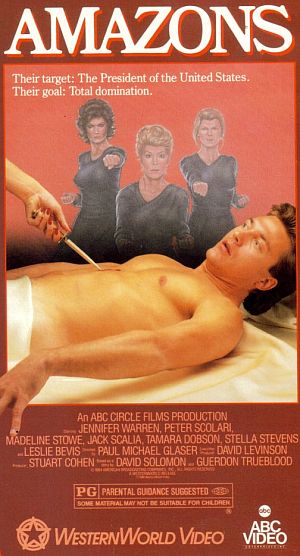 This made for TV movie first aired in January 1984, and was likely fairly topical at the time, with Geraldine Ferraro then on her way to becoming the VP behind Walter Mondale. It’s still just her and Sarah Palin as far as major party tickets in American history go. Her candidacy is foreshadowed by this piece of masculine paranoia. Stowe plays Dr. Sharon Fields, a doctor who is sued for malpractice after her hospital patient, a leading Congressman, had an unexpected psychotic episode, which leads to him playing in traffic. She finds a series of similar deaths linked by trace elements found in autopsies, all of men, whose deaths benefit women, in general or specifically. Turns out they are assassinations, carried out to the orders of an ancient, matriarchal cult: they now have their eye set on the leading presidential candidate – who just happens to have picked a woman as his running mate.
This made for TV movie first aired in January 1984, and was likely fairly topical at the time, with Geraldine Ferraro then on her way to becoming the VP behind Walter Mondale. It’s still just her and Sarah Palin as far as major party tickets in American history go. Her candidacy is foreshadowed by this piece of masculine paranoia. Stowe plays Dr. Sharon Fields, a doctor who is sued for malpractice after her hospital patient, a leading Congressman, had an unexpected psychotic episode, which leads to him playing in traffic. She finds a series of similar deaths linked by trace elements found in autopsies, all of men, whose deaths benefit women, in general or specifically. Turns out they are assassinations, carried out to the orders of an ancient, matriarchal cult: they now have their eye set on the leading presidential candidate – who just happens to have picked a woman as his running mate.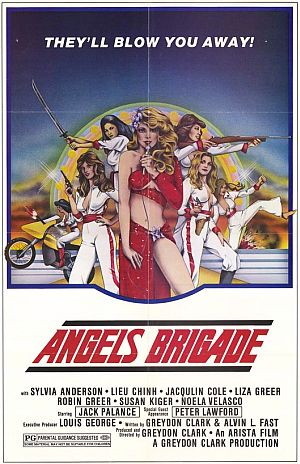 After her brother is severely beaten by a drug dealer, Las Vegas lounge singer (!) Michelle Wilson (Kiger, Miss January 1977) is visited by his teacher (Cole), who knows the location of the cartel’s drug warehouse. Wilson puts together a team of women who have reason to want to take the dealers down, including a stuntwoman (Anderson) and an undercover cop (Grant). There’s also a martial-arts instructress, a model and, tagging along, one of the teacher’s pupils. They build a heavily-armed van, train in the ways of war, and rip off a bunch of militia types for weaponry, before staging a successful raid that destroys the warehouse. However, the mob (led by veteran actors Peter Lawford and Jack Palance) are not prepared to let them get away with it.
After her brother is severely beaten by a drug dealer, Las Vegas lounge singer (!) Michelle Wilson (Kiger, Miss January 1977) is visited by his teacher (Cole), who knows the location of the cartel’s drug warehouse. Wilson puts together a team of women who have reason to want to take the dealers down, including a stuntwoman (Anderson) and an undercover cop (Grant). There’s also a martial-arts instructress, a model and, tagging along, one of the teacher’s pupils. They build a heavily-armed van, train in the ways of war, and rip off a bunch of militia types for weaponry, before staging a successful raid that destroys the warehouse. However, the mob (led by veteran actors Peter Lawford and Jack Palance) are not prepared to let them get away with it. ★★★½
★★★½ But the central idea is the one of Ripley now being something more than human, and Weaver has a great deal of fun with that, playing as if she’s half a beat ahead of everyone else, and completes her transition by no longer being scared of the aliens. It’s them who need to be scared of her, and again, I’m reminded of Milla Jovovich in the RE series: more than human, and yet, less than human at the same time. There’s even a creature with the proportions the other way round – monster with a touch of human – like Nemesis from RE: Apocalypse, and it was no surprise to read that Paul W.S. Anderson was one of the many directors considered for this (Danny Boyle, Peter Jackson, Bryan Singer and David Croneberg beinh among the others). I briefly drifted off to speculate on the possibility of an Alien vs. Resident Evil cross-over; would probably have been a lot more fun than anything involving Predators.
But the central idea is the one of Ripley now being something more than human, and Weaver has a great deal of fun with that, playing as if she’s half a beat ahead of everyone else, and completes her transition by no longer being scared of the aliens. It’s them who need to be scared of her, and again, I’m reminded of Milla Jovovich in the RE series: more than human, and yet, less than human at the same time. There’s even a creature with the proportions the other way round – monster with a touch of human – like Nemesis from RE: Apocalypse, and it was no surprise to read that Paul W.S. Anderson was one of the many directors considered for this (Danny Boyle, Peter Jackson, Bryan Singer and David Croneberg beinh among the others). I briefly drifted off to speculate on the possibility of an Alien vs. Resident Evil cross-over; would probably have been a lot more fun than anything involving Predators.
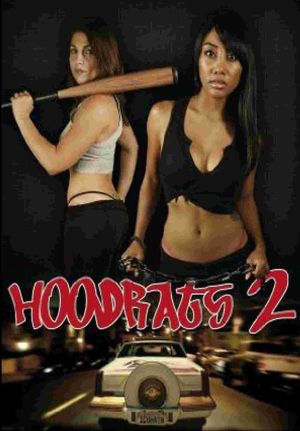 When Chino (Rodil) beats up his woman, Lucia (Sparagna) decides it has happened for the last time, and accompanied by her two friends, Celia (Mortel) and Miriam (Cho), she gives him a dose of his own medicine, with a baseball bat. This turns out to be a clear case of thinking without acting, because it turns out he’s a big kahuna in one of the local gangs, and is now out for revenge on the trio. After a drive-by cripples their vehicle (a ghettomobile with the amusing personalized plate, ‘ICUHATN’), they are stuck deep in enemy territory, with a lot of unfriendly people looking for them. And even if they make it out alive, what then?
When Chino (Rodil) beats up his woman, Lucia (Sparagna) decides it has happened for the last time, and accompanied by her two friends, Celia (Mortel) and Miriam (Cho), she gives him a dose of his own medicine, with a baseball bat. This turns out to be a clear case of thinking without acting, because it turns out he’s a big kahuna in one of the local gangs, and is now out for revenge on the trio. After a drive-by cripples their vehicle (a ghettomobile with the amusing personalized plate, ‘ICUHATN’), they are stuck deep in enemy territory, with a lot of unfriendly people looking for them. And even if they make it out alive, what then? Eryn Cates (Hague) returns home to Texas from finishing school in New York, to find her family farm teetering on the edge of foreclosure [maybe if they hadn’t spent all that money to send her to finishing school in New York…]. In a misguided attempt to help things, her brother tries to rob a stagecoach carrying payroll, but is injured. The attempt fails, but local mogul Mortimer (Harris), who holds the loan on the Cates farm, sees a chance and pockets the loot. Two Texas Rangers, including the young and handsome Flint (Hagenbuch) show up to investigate the robbery, but it’s up to Eryn to save the family property, take on the mantle of the bandit, fend off the unwanted advances of Mortimer and engage in pseudo-romantic banter of the least interesting or convincing sort with Flint.
Eryn Cates (Hague) returns home to Texas from finishing school in New York, to find her family farm teetering on the edge of foreclosure [maybe if they hadn’t spent all that money to send her to finishing school in New York…]. In a misguided attempt to help things, her brother tries to rob a stagecoach carrying payroll, but is injured. The attempt fails, but local mogul Mortimer (Harris), who holds the loan on the Cates farm, sees a chance and pockets the loot. Two Texas Rangers, including the young and handsome Flint (Hagenbuch) show up to investigate the robbery, but it’s up to Eryn to save the family property, take on the mantle of the bandit, fend off the unwanted advances of Mortimer and engage in pseudo-romantic banter of the least interesting or convincing sort with Flint.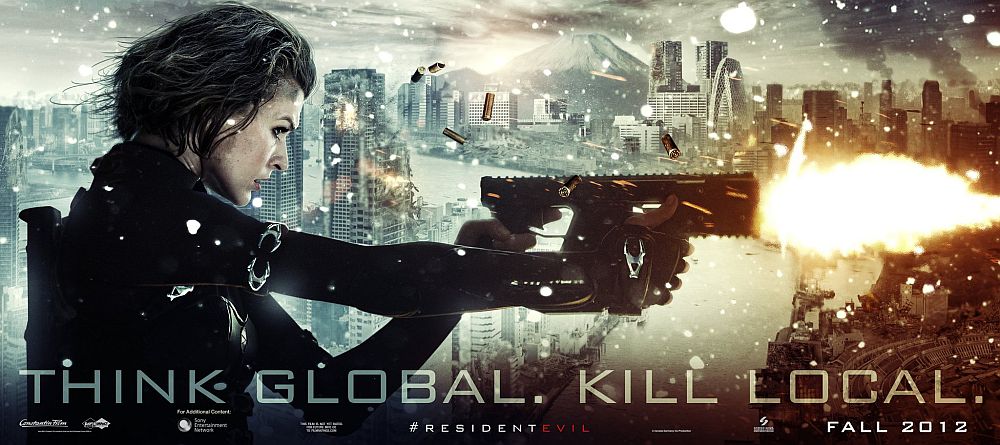 ★★★★
★★★★ While being (again) largely disappointed by the previous entry, Afterlife,
While being (again) largely disappointed by the previous entry, Afterlife, 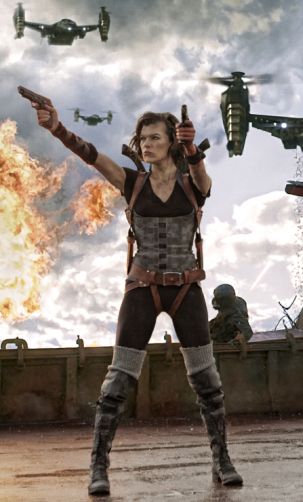 Though actually, this is almost a “greatest hits” package, especially in terms of participants. Not seen since the first film, are Rain Ocampo (Michelle Rodriguez) and James Shade (Colin Salmon). Apocalypse brought us Jill Valentine (Sienna Guillory) and Carlos Olivieira (oded Fehr), while Extinction introduced the audience to Claire Redfield (Ali Larter) and K-Mart (Spencer Locke). Finally, Afterlife was the debuts of Luther West (Boris Kodjoe) and Chris Redfield (Wentworth Miller). But they are
Though actually, this is almost a “greatest hits” package, especially in terms of participants. Not seen since the first film, are Rain Ocampo (Michelle Rodriguez) and James Shade (Colin Salmon). Apocalypse brought us Jill Valentine (Sienna Guillory) and Carlos Olivieira (oded Fehr), while Extinction introduced the audience to Claire Redfield (Ali Larter) and K-Mart (Spencer Locke). Finally, Afterlife was the debuts of Luther West (Boris Kodjoe) and Chris Redfield (Wentworth Miller). But they are 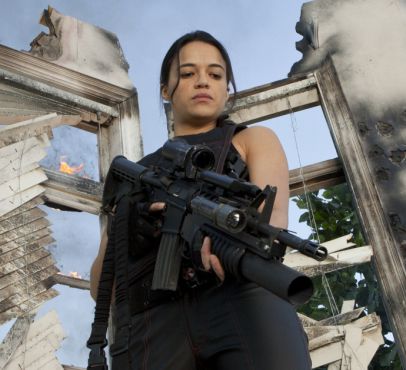 It might be wise for Jovovich to contemplate retirement from the series. After all, she turned 37 earlier this month, and there are few things sadder than an action hero/ine desperately clinging on, past their prime (see also, Universal Soldier: Day of Reckoning). She’s not quite there
It might be wise for Jovovich to contemplate retirement from the series. After all, she turned 37 earlier this month, and there are few things sadder than an action hero/ine desperately clinging on, past their prime (see also, Universal Soldier: Day of Reckoning). She’s not quite there 















